TEM4便条写作方法分析及参考范文
专四写作便条范文解析

专四写作便条范文解析引导语:下面小编就为大家带来专四写作便条范文解析,希望能够帮助到大家,谢谢您的阅读。
一、TEM4 便条的基本要求(一) 格式(format)正确TEM4 便条的格式与普通英文书信格式基本相同。
具体来说,它应有日期(date)、称呼(saluwfion)、正文(body)及结尾(ending),结尾包括结尾套语(complimentary close)和签名(signature)。
1.日期指写便条的日期。
英文便条与汉语便条的日期写的地方有别,前者的日期一般写在便条的右上角,偶尔也见写在便条的左上角,而后者的日期则写在便条的右下角,即写在签名的下面。
英文日期与汉语日期的写法也有不同,汉语一般先写年,然后再写月、日,而英文则一般把年份写在月、日的后面。
另外,英文日期的月、日与年之间通常用逗号隔开。
例如,2008 年4 月21 日通常写成April 21,2008 或April 21 st,2008;当然,由于是非正式书信,也可以去掉年份,写成Ap l 2l 或April 21st(不过,这种写法,只是最近两年才被TEM4 接受),或者写成21/4/2008 或4/21/2008。
日期能说明便条的有效度,没有日期,则会使人感到茫然。
2.称呼称呼是指写便条人对收便条人的称谓,一般都以Dear 开头,写在日期下一两行、留出左页边空白,顶格写。
TEM4 试卷中一般对写便条人与收便条人之间的关系作了提示。
提示中的you 指的是写便条人,提到的另一方便是收便条人。
称呼时,一般只需在其名字前加Dear 即可,如Dear Susan,Dear Tom。
若此人有头衔(social title),称呼时,便要保留其头衔,例如Dr.Herce,要称Dear Dr.Pierce,不称Dear Pierce。
如果提示中的另一方是以Mrs Wang 或Mr Wang 出现,称呼时。
TEM4便条写作
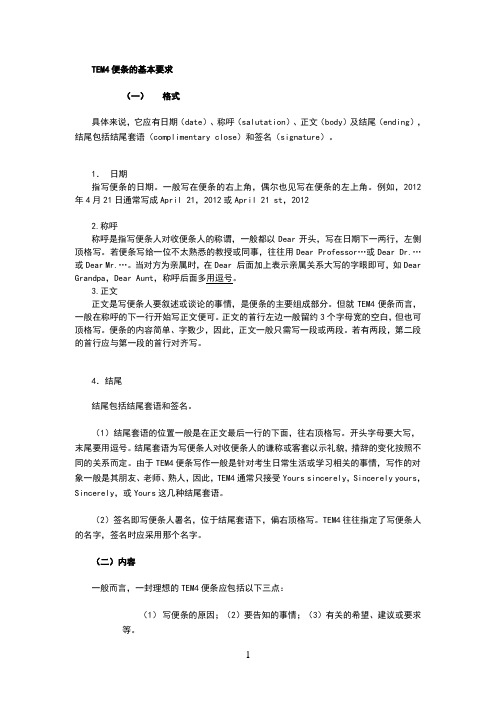
TEM4便条的基本要求(一)格式具体来说,它应有日期(date)、称呼(salutation)、正文(body)及结尾(ending),结尾包括结尾套语(complimentary close)和签名(signature)。
1.日期指写便条的日期。
一般写在便条的右上角,偶尔也见写在便条的左上角。
例如,2012年4月21日通常写成April 21,2012或April 21 st,20122.称呼称呼是指写便条人对收便条人的称谓,一般都以Dear开头,写在日期下一两行,左侧顶格写。
若便条写给一位不太熟悉的教授或同事,往往用Dear Professor…或Dear Dr.…或Dear Mr.…。
当对方为亲属时,在Dear 后面加上表示亲属关系大写的字眼即可,如Dear Grandpa,Dear Aunt,称呼后面多用逗号。
3.正文正文是写便条人要叙述或谈论的事情,是便条的主要组成部分。
但就TEM4便条而言,一般在称呼的下一行开始写正文便可。
正文的首行左边一般留约3个字母宽的空白,但也可顶格写。
便条的内容简单、字数少,因此,正文一般只需写一段或两段。
若有两段,第二段的首行应与第一段的首行对齐写。
4.结尾结尾包括结尾套语和签名。
(1)结尾套语的位置一般是在正文最后一行的下面,往右顶格写。
开头字母要大写,末尾要用逗号。
结尾套语为写便条人对收便条人的谦称或客套以示礼貌,措辞的变化按照不同的关系而定。
由于TEM4便条写作一般是针对考生日常生活或学习相关的事情,写作的对象一般是其朋友、老师、熟人,因此,TEM4通常只接受Yours sincerely,Sincerely yours,Sincerely,或Yours这几种结尾套语。
(2)签名即写便条人署名,位于结尾套语下,偏右顶格写。
TEM4往往指定了写便条人的名字,签名时应采用那个名字。
(二)内容一般而言,一封理想的TEM4便条应包括以下三点:(1)写便条的原因;(2)要告知的事情;(3)有关的希望、建议或要求等。
英语专业四级考试便条写作解析
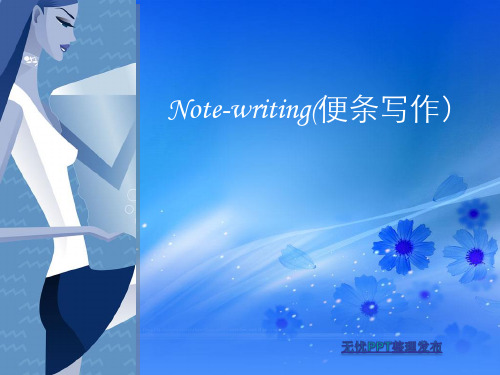
Dear Jane,
拼写错误
Hearing you want to subscribe an English-languge newspaper. I
• 2)假设情景、灵活处理人际关系、圆满解决实际问题。
• 语言得体内容和语言是一个统一体。内容抓住后,应以恰 当的语言来表达。一般来说,便条的语言要简单明嘹,用 词平易。当然,语言风格还应与情景一致,不同的对象, 所使用的语言应有所不同。相对来说,对上级、长者、不 熟悉的人的语言较为正式,对亲朋好友的语言则较为随便。 不过,不管对方是谁,行文中都应体现态度诚恳礼貌。
• 格式-format
2.称呼
April 22, 2014 Dear Professor Wang,
I’m very sorry I didn’t keep the appointment with you yesterday because of my sick roommate. As his close friend, I had to look after him the whole day. I wonder if you’d mind having another appointment with me at your office at four o’clock tomorrow afternoon.
I’m expecting your reply. Yours sincerely, George
1.日期 3.正文
5.署名
4.套语
Part I: Note-writing(便条写作) ---格式
专四写作便条
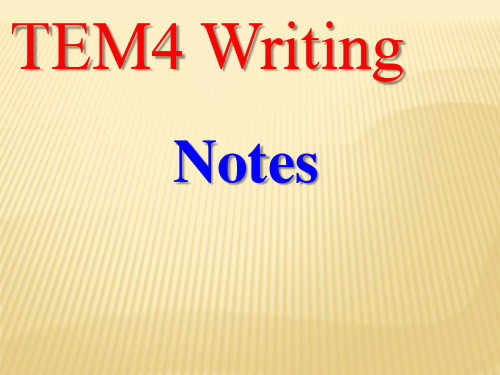
三、格式规范
TEM4 便条写作对格式的要求很严格。具体来
说,它应有日期(date)、称呼(saluwfion)、正 文(body)及结尾(ending),结尾包括结尾套语 (complimentary close)和签名(signature)
the class. It is remarkable of you to be so devoted and considerate to our class I definitely want to join you, especially after having been up to my neck in my term paper for weeks. Marry told me that the event falls on May holiday. Have you come up with where we go and how? We have great expectations for it .Please let me know what happens as soon as possible.What if we get together some time this evening?
二、审题准确
2002年 You have heard that your friend, Jack, wishes to sell his walkman. Write him a note expressing your interest in it, asking him about its condition and offering a price for it.
便条整理1 (1) 以自身写作逻辑整理出常见专四英语便条写作

Advice or recommendation建议/推荐1.为什么会引起建议/推荐的想法——对方求寻求你的建议,知道对方的某些情况,知道对方需要什么,知道对方需要什么帮助…2.建议/推荐什么3.建议推荐的原因,理由——建议推荐的东西有何优点,对她/他有什么好处∴觉得对方可能喜欢或应该接受这个建议4.希望自己的建议推荐能有所帮助/希望对方喜欢你的建议或推荐April 16th Dear **,…………..Yours sincerely,** 1.为什么会引起建议/推荐的想法——对方求寻求你的建议,知道对方的某些情况,知道对方需要什么,知道对方需要什么帮助…●I learned that you wanted to do…,so I’m writing to give you myrecommendation.●I am so happy that you asked for my suggestions with regard to…2.建议/推荐什么●In my opinion, … is good choice.●I strongly recommend you to do…3.建议推荐的原因,理由——建议推荐的东西有何优点,对她/他有什么好处∴觉得对方可能喜欢或应该接受这个建议●I suggest so because…4.希望自己的建议推荐能有所帮助/希望对方喜欢你的建议或推荐●I hope you find my suggestion helpful and wish you a niceday/tour/time●I think you might be interested in it.Invitation 邀请1.引起邀请的背景、事件(时间、地点、人物、事情的具体内容)2.为什么想邀请sb (1.觉得她/他会感兴趣 2.很想要与他/她一起do sth)3.约时间、地点4.希望对方接受邀请,确定对方到底来还是不来April 16th Dear **,…………..Yours,**1.引起邀请的背景、事件(时间、地点、人物、事情的具体内容)●There’s going to be…(事件)in/at…(地点)+时间there’ll be…(事件)in/at…(地点)+时间(例如:there’s going to )●We’re going to organize/have/hold…(事件)in/at…(地点)+时间●{可适当填充一下事件的好处或有趣之处例如,attending thelecture, we can be informed of the knowledge of…}2.为什么想邀请sb (1.觉得她/他会感兴趣 2.很想要与他/她一起do sth)●I think you must be very interested just like me.●I think you might be interested in it.●I’m sure you will be happy to do…●I sincerely hope you can do…●I would like to invite you to do…●We would like you to join us●Are you interested in coming?3.约时间、地点●(Shall we go together?)Shall we meet in/at…(地点)at…具体时间p.m/a.m+tomorrow/Friday…4.希望对方接受邀请,确定对方到底来还是不来●Please let me know if you’d like to go.●If it is not convenient, we could fix another date.●Please let me know if you have a plan of your own.Accepting an invitation接受邀请前后表感谢贯穿兴趣与期待1.感谢对方的邀请,需要的话就顺便对邀请的时间地点人物事情内容简描2.对邀请的内容很感兴趣,(将准时赴约)3.再次感谢,表期待April 16th Dear **,…………..Yours sincerely,**1.感谢对方的邀请,需要的话就顺便对邀请的时间地点人物事情内容简描●Thank you for asking me to do…(attend…/go…with you /joinyou )●I’m happy to be invited to do…●I’m happy to be informed of sth.●I’m so happy that you have invited me to do…(attend…/go…withyou /join you )2.对邀请的内容很感兴趣,(将准时赴约)●You know, I’ve always been interested in…+这个约会的好处优点意义(例如,it is a good opportunity for us to get informed of sth.// it is beneficial for us to know more about …)+ I’m sure I can benefit from this experience// I’m sure I will enjoy it.●You know, I’ve been enthusiastic about sth/ doing sth+这个约会的好处优点意义(例如,it is a good opportunity for us to getinformed of sth. // it is beneficial for us to know more about …)+ I’m sure I can benefit from this experience// I’m sure I will enjoy it.●You know, I’ve long heard about sth // I’ve long heard that…+这个约会的好处优点意义(例如,it is a good opportunity/way for us to get informed of sth. // it is beneficial for us to know more about …)+ I’m sure I can benefit from this experience// I’m sureI will enjoy it.// I’m sure that it will be s memorable experience.●(And / So) you can count on me to be punctual(准时赴约)3.再次感谢,表期待●I’m looking forward to doing sth .Again, my gratitude.●Many thanks again for your invitation.Apology 1Declining an invitation先感谢邀约再拒绝邀约(抱歉,解释)1先感谢邀约2想去可是无奈地要拒绝邀约// 可惜不能接受邀约3解释拒绝邀约的原因4再表遗憾+希望下次能再有这样的机会一起约会+希望对方玩得开心(+再感谢)April 16th Dear **,…………..Yours,**1先感谢邀约●Thank you for asking me to do…(attend…/go…with you /joinyou )●I’m happy to be invited to do…●I’m happy to be informed of sth.●I’m so happy that you have invited me to do…(attend…/go…withyou /join you )2想去可是无奈地要拒绝邀约// 可惜不能接受邀约+3解释拒绝邀约的原因●I really want to go/do…, but very regretfully I can’t because…●I really want to go/do…,but as …(例如,there’s going to be anexam next Monday and I have to focus on studying // I have an appointment with sb.),I’m afraid can’t do…4再表遗憾+希望下次能再有这样的机会一起约会+希望对方玩得开心(+再感谢)●I’m sorry if I let you down. Maybe we could fix another date andmake up for it. Nevertheless, wish you a good time. Thanks again for your invitation.●I’m terrible sorry if I let you down. Please go and enjoy yourself.I wish you a nice day // a wonderful time. Many thanks again foryour invitation.。
英语专业四级考试作-便条[1]
![英语专业四级考试作-便条[1]](https://img.taocdn.com/s3/m/7f4c4800a6c30c2259019e54.png)
英语专业四级考试作文———便条三江大学英语系余丽华在英语专业四级考试的六大部分,即听写,听力理解,完形填空,语法和词汇,阅读以及写作中,写作占据了25%的比重,其中便条的写作是10%的比重。
便条写作是英语应用文写作的一部分,它有其一定的写作规范要求,并且针对不同的写作目的,都有一些常见常用的句型,就此我简单对这些句型作了一个总结,附上一些范文,可供大家参阅。
要了解便条的结构,首先我们可以先了解一下书信的写作结构。
一般书信的结构由上而下:信头(Heading, 发信人地址和日期在右上角)、收信人姓名和地址(Inside Address,Introductory Address;在左上)、称呼(Salutation)、信的正文(Body of the Letter)、结束语(Complimentary Close)、签名(Signature)、附件(Enclosure,简写为Encl., Enc.)、再启(Postscript,简写为P.S.),其中前六项是书信的主要部分,一般不可缺少;最后两项是否需要,则视情况而定。
亲戚朋友间的私人信件也可酌情省略第一二两项。
便条是一种简单的书信。
虽然内容简单,但却有其独特的风格。
主要目的是为了把最信息、通知、要求或者活动的时间、地点简明地告之对方。
常见的便条有留言,请假条,邀请信及回函,通知,感谢信,祝贺信等。
特点:语言尽量通俗口语化,简单扼要,直截了当,无需使用客套语言;中心内容务必突出,更要注明活动的时间及地点;便条不需邮寄,不用信封。
通常请人代为转交;有时可写在留言板或留言簿上。
基本写作格式:便条内容和类型不尽相同,格式可以灵活变通。
但各类便条必须包括以下几个基本要素;1.Date:便条日期2.Salutation:称呼3.Body:正文4.Signature:签名。
Contents1. Notes of thanks2. Notes of invitationNotes accepting invitationsNotes declining invitations3. Notes of introduction4. Notes of congratulation5. Notes of asking for leaveNotes of asking for an extension of leave 6. Notes to make arrangementsNotes to cancel appointments7. MessagesTelephone messages8. Notes of condolence9. Notes asking after one’s health10. Notes that give informationReceiptA bill signed in acknowledgement of debtNotes returning something borrowed11. Notes to keep in touch with friends12. Notes regretting not seeing someone13. Notes offering tickets to friends14. Notes accompanying presentsNotes of thanksIn notes of thanks, besides expressing our gratitude, we also show our pleasure at the gift itself, for example, we may say that it is exquisite or it is just what we want, etc. We may also show our appreciation of the sender’s considerateness or he/ her cleverness at picking out the rig ht thing, etc.感谢信往往在开头就要点明写作的目的,下面是一些常用句型1.Thank you very much for ....2.Many thanks for your ...3.Please accept my sincere appreciation for ...4.I am truly grateful to you for ...5.It was good (thoughtful) of you ...6.You were so kind to ...7.I wish to express my profound appreciation for ..8.Thank you again for your wonderful hospitality and I am looking forward to seeing you soon.9、I find an ordinary "thank-you" entirely inadequate to tell you how much...10、I sincerely appreciate ...11、I wish to express my profound appreciation for ...12、Many thanks for you generous cooperationReference version1)St. Jones Hospital10 Howard StreetAug.14, 200Dear John,Very many thanks to you, my dear friend, for the splendid present that you have sent me, and I feel deeply moved by this token of your affection. The book you chose to offer me is very interesting and instructive. I have read a few pages with great eagerness. It is a great consolation for me, in my confinement to the hospital by illness. I am sure there will be great pleasure and benefit in store for me.I am glad to tell you, friend, I am making rapid progress toward health every day. It is my hope that I shall soon be able to inform you of my complete recovery.Looking forward to joining you at school as soon as possible.Yours affectionately,Jane2)26 December,2006 Dear Aunt Mabel,Thank for your wonderful gift! How could you possibly have known? I did need a more sophisticated recorder. The old one that I have has seen me mature from a lanky schoolboy to a college student. Indeed, it has more than served its purpose. Remember? It was also a present from you. Again a million thanks!Your loving nephewHenry3)2 January, 2006Dear Father,Imagine my pleasure when I returned home for the weekend! An exquisite computer on my desk! Though not of the latest model, it’s more than enough for me. It will not only make my studies easier, but will save me a lot of time as well. Dear father, you are always so thoughtful. It’s indeed lucky to be your son! Thanks a million.Love,MikeNotes of invitationAny note of invitation should state precisely the following:1. What invitation it is2. The time and the place3. The pleasure of seeing the addressee on that occasion4. A reply is expected ( In some, this is not mentioned.)5. The reason for inviting the addressee (optional)以下是邀请信的11个常用句型1、I’d like ...to come to dinner2、request the pleasure of3、The favor of a reply is requested4、May I have the honor of your company at dinner?5、Thank you for inviting us to dinner6、I hope you’re not too busy to come.7、The reception will be held in ...,on ...8、We sincerely hope you can attend9、We are looking forward to ...10、We have decided to have a party in honor of the occasion11、Please confirm your participation at your earliest convenienceReference version1)20 October, 2006Dear MeiliWe are going to have a music appreciation evening in our classroom this coming Saturday. The time is 7:30 pm. Symphony No. 9 of Beethoven will be on the program. We would like to have you join us, as we know you are one of the classical music lovers. Drop me a line if you are interested. Hoping to see you on Saturday.Wang Fang2)17 September, 2006Dear Frank,There will be a sports meet on Thursday, 25 September, in our university. Some sports stars will participate to show their skills. Lots of our friends will be here, too. And there will be a tea party afterwards. Call or write to say that you are coming.Yours,Gerald3)6 June, 2006Dear Mary and John,We have just moved to a suburban district in southwestern Shanghai. Now that everything is more or less orderly again, we are going to have house-warming party this coming Saturday afternoon, 11 June.We want you to see for yourself that living in the country is not so terrible after all, what with the fresh air, clear sky and, above all, the subway that can take us to the city proper almost in no time.We will have a good time on Saturday, we are sure. Many old friends are coming, too. Give us a ring to say that you are coming.Yours,Jill and JackNotes accepting / declining invitationsA). A note accepting an invitation includes:1. Appreciation of being invited2. His/her certainty of having a good time3. His/her assurance of being punctual / his/her apology for having to be late(optional)4. His/her offer of help (optional)5. His/her looking forward to the occasionReference version1)16 March, 2006Dear Rebecca,Thank you for asking me to come to your house-warming party. I have long heard that you’ve moved to the suburbs, away from all kinds of conveniences. I’m a little surprised that you seem quite happy with your new house. I’d be only too happy to come and see for mys elf. You can count on me to be punctual. You’re quite a green hand at housekeeping, as is known to all. Do you want me to come earlier to help? Looking forward to seeing you.Love,Kate2)18 May, 2006Dear Bill,I’m happy to be informed of our alumni get-together. Surely I will meet many old friends and we will be able to chat over days long gone by. Incidently, do you know that Prof. Chadi arrived in our city yesterday? I think his presence will make our meeting more memorable. He can be reached by phone no. 84123348.Yes, I’ll be prompt. I’m counting the days to see you all.Yours,MartinB). A note declining an invitation includes:1. Appreciation for being invited2. Reason for not being able to attend3. Regret for missing such an occasion4. Extending felicitation, etc, should the occasion requireReference version:1)14 April, 2006Dear Rebecca,Thank you for inviting me to your 20th birthday party. But alas, I must stay away from this gala occasion, which, to me, is excruciatingly painful. You see, I’ve been down with the flu for some time now. And I was told that I wouldn’t be able to recover soon. I can’t pass on the virus to you all. It really breaks my heart to miss this party! All the same, my heartiest congratulations!Yours,Kate2)9 June, 2006Dear Wenhua,Thanks for inviting me to the chamber music concert to be given at the golden wedding anniversary party of your grandparents. I really ought to be there, but as I have an appointment with professor Zhang, who is leaving for the United States the next day, I’m afraid I can’t be present. I’m dreadfully sorry to have to be absent from this very important occasion. Indeed, their kindness to me when I was a child has always been remembered with gratitude. I also regret to have to miss the chamber music, which I adore. Please extend my heartiest congratulations to your grandpa and grandma.Yours,MinhaoNotes of introductionIn notes of introduction, the following are usually included:1. The name of the person to be introduced2. His / her identity3. The purpose of introduction4. Appreciation (It would be highly appreciated that…./ I would appreciate it if…)Reference version1)1 June,2006Dear Mr. Sullivan,This is to introduce Mr. Hu Ming. He is a linguistics student at our university. Mr. Hu is looking for a teaching assistant’s post. Any assistance rendered h im would be highly appreciated. Thank you.Sincerely yours,Geoffrey Jackson2)16 October, 2006Dear Mr. Wang,Liu Li is an English literature student. She is presently working on a paper on modern English literature. I would appreciate it if you could help her locate some reference books she needs badly. Thank you.Liang BeijunNotes of congratulationIn writing a note of congratulation, one usually relates how he/she hears of the good news, what the good news is, how he/she is happy for the addressee…, and t hen extends his/her congratulations.Reference version1)20 November, 2006Dear Prof. Cai,We have just been informed that your lifework on elementary Chinese teaching methodology had been fully recognized during thr recent international conference on language education where your article “ Teaching Chinese as a Foreign Language” was awarded first prize. This is the first honor ever won by a Chinese scholar. Since we are your students, we know, of co urse, how you’ve worked. You are fully worthy of it! Please accept our heartiest congratulation!Respectfully yoursRon, Mabel, Kay, Pete2)1 April, 2006Dear Henry,I read from the newspaper that you were awarded the second prize at the National Photo Contest. Congratulations! I also learned that you were the only amateur participant, and you are only a first- year college student. Your parents must be very proud of you, especially your father, who has trained you in this hobby. Again my felicitations to you!EdwardNotes asking for leave/ asking for an extension of leave 往往指由于生病或特殊情况不能亲自当面请假,用假条的形式告假。
专四便条
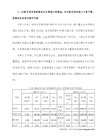
七. 婉拒类便条
【框架陈列】
Date
Dear ,
Thank you very much for your invitation . But I’m sorry to tell you that .
Sincerely yours,
Signature
【框架示例】
Write a note of about 50-60 words ed on the following situation:
Before you leave university you want to sell your bike. Write a note describing the condition of your bike, how much you would like for it, and how you can be contacted.
I just want you not to be so depressed. You know everything will be all right. Therefore, I do hope you can pull yourself together as soon as possible.
Marks will be awarded for content, organization, grammar and appropriateness.
九. 询问类便条
【框架陈列】
Date
Dear ,
I’ve learnt that . Since it holds much interest for me, could you be kind enough to tell me some details about it?
便条写作格式及范文
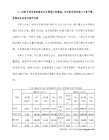
称呼顶格、日期在右、首行缩进、署名签在后
英文书信由6个部分组成:信头、信内地址、称呼、正文、谦语和署名。而便条写作有别于普通的书信,属
于非正式书信。它的格式非常清晰简单。它的篇幅短小,无需写信内地址,有时也无需写祝词和谦语。如此
清晰的格式,我们可以将其简单地总结为:"称呼顶格、日期在右、首行缩进、署名签在后"。一篇便条作文格式
Yours,
Tom
邀请便条类
邀请类便条是非常实用的一类便条,无论是在正式的邀请函上还是朋友熟人间的邀请都有可能用到它。虽然近几年四级考试中只考过一次,我们对其还应该有相当的重视。
Write a note of about 50—60 words based on the following situation:
(最亲密的人之间):YOurs访vingly,DeVOt出的yOuYS
下面是一则邀请类便条的示例:
9 a. m., May 11
Dear Mike,
I've got two tickets to a concert given by the famous pop band Nightingale. Yesterday I waited in a long queue in order to buy them because I've been looking forward to listening to this concert. It is to begin at 7 p. m. tomorrow. I have no classes tomorrow. Are you also free tomorrow? Would you like to come with me? When your classes are over, please phone me.
便条写作格式及范文

便条写作格式及范文便条写作关于格式便条(又称短笺)作为专业英语四级考试对英语应用文(practicalwriting)的考查点之一,是每年的固定题目。
2005年专业四级考试大纲将便条的分值由5分增至10分。
分值的增加应当引起我们对这道题目的重视。
考试大纲对英语专业写作便条部分的测试要求是:"根据提示写大约50~60词的便条、通知、请帖等。
要求做到格式正确,语言得体。
考试时间为10分钟。
"由此我们可以看出它所涉及的考点是格式和语言得体性。
因此我们可以从格式、开篇结尾、表达是否清楚得当以及如何使用委婉语气和敬词这几方面着手进行复习和练习。
便条根据其用途可分成很多类,这里我们着重讲经常考的几类:邀请类便条、致歉类便条、通知类便条、致谢类便条和祝贺类便条。
然后我们会以范文的形式解读其他类便条的写作步骤和内容重点。
便条写作是专四写作部分考试中得分很有灵活性的一道题目,既可能得满分,也可能得分很低。
其得分高低的关键之一在于格式是否正确。
考试大纲对英语专业写作测试要求中提到:"便条写作最主要的是注意格式正确"。
因此我们首先要熟练掌握便条写作的格式。
称呼顶格、日期在右、首行缩进、署名签在后英文书信由6个部分组成:信头、信内地址、称呼、正文、谦语和署名。
而便条写作有别于普通的书信,属于非正式书信。
它的格式非常清晰简单。
它的篇幅短小,无需写信内地址,有时也无需写祝词和谦语。
如此清晰的格式,我们可以将其简单地总结为:"称呼顶格、日期在右、首行缩进、署名签在后"。
一篇便条作文格式可用以下简图示意:1?称呼要顶格,可根据亲疏关系冠以尊称或直呼姓名。
可用Dear Sir or Madame,Dear Tom等正式称呼,也可直呼其名。
在称呼后面一般用逗号(英国式),有时也可以用冒号(美国式)。
我们习惯上还是用逗号。
写给亲人和关系密切的朋友时,用Dear或My Dear再加上表示关系的称呼或直呼其名。
英语专业四级小作文之便条
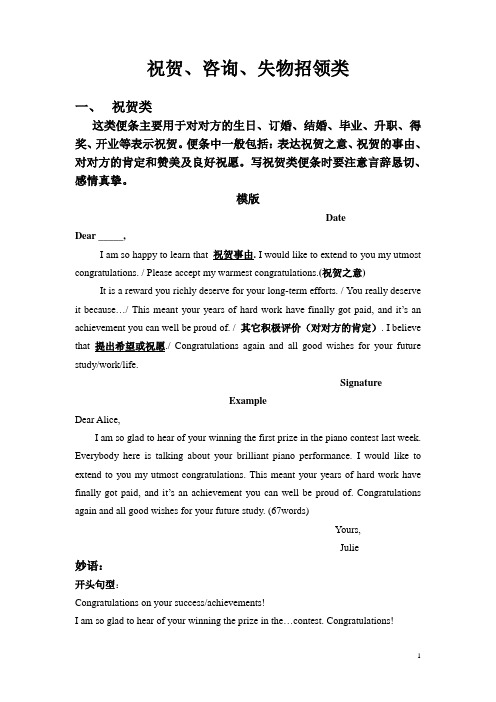
祝贺、咨询、失物招领类一、祝贺类这类便条主要用于对对方的生日、订婚、结婚、毕业、升职、得奖、开业等表示祝贺。
便条中一般包括:表达祝贺之意、祝贺的事由、对对方的肯定和赞美及良好祝愿。
写祝贺类便条时要注意言辞恳切、感情真挚。
模版DateDear _____,I am so happy to learn that 祝贺事由. I would like to extend to you my utmost congratulations. / Please accept my warmest congratulations.(祝贺之意) It is a reward you richly deserve for your long-term efforts. / You really deserve it because…/ This meant your years of hard work have finally got paid, and it’s an achievement you can well be proud of. / 其它积极评价(对对方的肯定). I believe that 提出希望或祝愿./ Congratulations again and all good wishes for your future study/work/life.SignatureExampleDear Alice,I am so glad to hear of your winning the first prize in the piano contest last week. Everybody here is talking about your brilliant piano performance. I would like to extend to you my utmost congratulations. This meant your years of hard work have finally got paid, and it’s an achievement you can well be proud of. Congratulations again and all good wishes for your future study. (67words)Yours,Julie妙语:开头句型:Congratulations on your success/achievements!I am so glad to hear of your winning the prize in the…contest. Congratulations!Please accept my heartiest congratulations on your graduation from…Heartiest congratulations upon your…A word of congratulation just doesn’t seem enough, so I am sending you a gift that I am sure you will find useful.I want to congratulate you with all my heart.I warmly congratulate you on what you’ve achieved.I congratulate you on…Please add my warmest congratulations to…Allow us to give our most sincere congratulations on this exciting occasion.We take this opportunity to express our best wishes to you.Please allow me to congratulate you on...Please allow me to extend my hearty congratulations to you.结束用语I wish you all possible joy and happiness in the world.We hope you will have nothing but joy and happiness in your life together and in your chosen career.Wish you the best luck and happiness.Please accept my heartfelt congratulations!I would like to express my best wishes and warmest congratulations to you.Here is a word of cheer on your birthday from a warm friend,congratulations and all good wishes to you!二、咨询类这类便条主要用于就不清楚的事情向他人咨询或询问,如询问产品信息、咨询活动情况等。
专四便条写作及范文~

专四便条写作及范文~英语应用文写作之便条写法基本写作格式便条内容和类型不尽相同,可以灵活变通。
但各类便条必须包括以下几个基本要素;1)Date:便条日期2)Salutation:称呼3)Body:正文4)Signature:署名样例欠条;留下字据,表示欠某人某物。
条据上需写明钱物名称和数量、立据人及日期。
不得涂改。
April 19, 2012 Borrowed from the Foreign Language Department Reference Library three books as follows: A copy of EnglishHistory and Anthology of English Literature by Wu Weiren A copy of A Survey of American Literature by Chang Yaoxin A copy of World Literature by Jiang Chengen.Wu ZhuoFor the Office ofSocial Science Department留言;用书面留下要说的话。
留言涉及的方面很多,包括约会,通知,请求等任何可用便条留下的口信。
Tuesday Dear Li,As the Spring Festival is drawing near, I’m very glad to invite you to come to a dinner party with several other friends of ours. I’m sure we will have a very happy time and enjoy ourselves thoroughly. Would you like to come on time at 5:00 p.m. today, to Room 6 of Lijing Hotel?Yours always,Jiayang请假条:往往指由于生病或特殊情况不能亲自当面请假,用假条的形式告假。
TEM-4便条
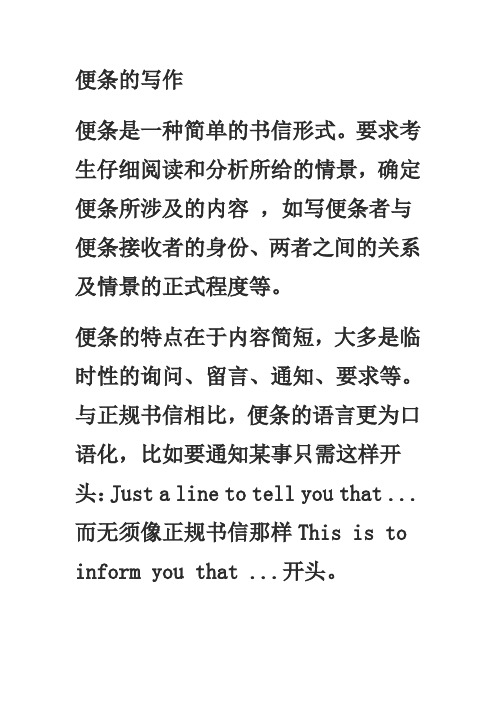
便条的写作便条是一种简单的书信形式。
要求考生仔细阅读和分析所给的情景,确定便条所涉及的内容,如写便条者与便条接收者的身份、两者之间的关系及情景的正式程度等。
便条的特点在于内容简短,大多是临时性的询问、留言、通知、要求等。
与正规书信相比,便条的语言更为口语化,比如要通知某事只需这样开头:Just a line to tell you that ...而无须像正规书信那样This is to inform you that ...开头。
有急事需要告诉别人而又不能面谈时,就可以写便条,如请假条、留言条等。
一般不写地址,与普通书信基本相同。
结尾时也无需要结尾礼词,只需要写上便条者姓名。
便条的日期通常写在右上角,一般只要写上星期几,也可以写明上午、下午的具体时间;日常应用中,写上几月几日的也很普遍。
但一般不写年份,因为便条的内容多半是当日或近日内要办的事情。
便条具有用途广泛、形式简单、文字要求不十分严格的特点。
基本写作格式便条内容和类型不尽相同,可以灵活变通。
但必须包括以下四个基本要素;1)Date:便条日期2)Salutation:称呼3)Body:正文 4)Signature:署名注意事项1.词句简洁,尽量避免应酬语和敬词2.切忌内容空洞、言不达意。
分类举例1)请假(Asking for Leave)例1 Directions: You are about to write a Business Leave Note of about 60 words. Please describe the information clearly. 1) the reason you ask for the leave 2) the time and how long you will leaveAug. 22ndSecretary Li,I’m sorry to apply for ten days’ leave from the Aug. 23rd to Sept. 3rd instant. As I have to leave with the time is urgent. My father now in the hospital is badly ill. I have to go to see him and take care of him for a few days. You know I’m the only child in my family. Of course I will show you the telegram about my father’s illness which is received from my mother to support my application.As concern as the missed lessons during my absence, I promise I will do my best to catch them on after I come back to the campus. Wish for your allowance.Yours respectfully,×××本文是一封请假条,一般我们要向上级或老师请假,通常用的是ask for leave这个短语,请三天假可写作:ask for three days’ leave;因病请假则是ask for sick leave. leave 在这里是名词用法,文中用的短语是apply for意为“申请”,含有更加郑重的意味,常用于下级对上级或晚辈对长辈的书面语中,“Only child”意为“独生子女”相应的,“独生女”译作“only daughter”而“独生子”译作“only son”. As concern as后面跟名词性结构,意为“涉及到,至于”与Concerning同义,两者可以互换。
语类分析的理论及应用——以TEM-4便条写作为语料

给提 示 写 5 0至 6 0个 单 词 的便 条 、通 知 、请 帖 。 考试 时 间是 1 0分钟 ,满 分 为 1 0分 ,从格 式 、内 容 、语言 以及 语言得 体 性 四方 面 进行 评 分 。这 四
摘
要: 本文 以语类 ( G e n r e )及语类分析 ( G e n r e a n a l y s i s ) 的相关 理论为依 据 ,以 1 9篇 T E M 一4写 作
测试 中便 条的真题 范例为语料 ,对 其进行语类分 析 。分别从 格式 、结 构 内容 、语言和语 言得体 性进 行分析 ,
探 索 出 便 条 的 特 殊 语 类 特 征 , 旨在 培 养 学 生 语 类 意 识 和社 会 文 化 意识 ,促 进 语 言 学 习 的 基 本 技 能 ,增 强 语 用 能力和实际交际能力 。 关键词 : 语类分析 ; 便 条 ;T E M- 4测 试 中图 分 类 码 :A 文 章 编 号 :X X X X - X X X X( 2 0 1 3 )0 1 - 0 0 4 6 - 0 4
请 、致 谢 、祝 贺 、慰 问及 留言等 目的 而写 的简 短
收 稿 日期 : 2 0 1 3 — 3 - 6
成 功便 条 ( 历年 T E M4 便 条 写作 测 试 真 题范 例 )
的格式 、结 构 内容 、语 言和语 言得 体 性进 行 分 析 探 索 ,提 高 学 生 的语 类 意 识 和 应 用 能 力 ,同 时 ,
t u r k, 2 0 0 6; V. K. Bh a t i a, 2 0 0 8; Hu i l i n g Di n g,
12种便条类型范文
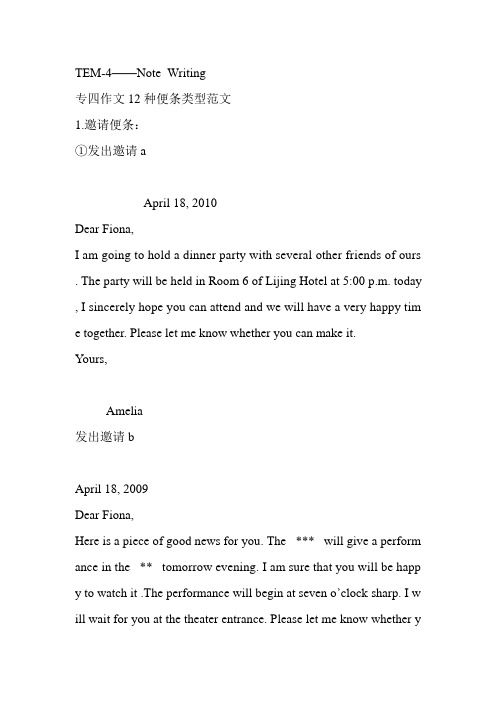
TEM-4——Note Writing专四作文12种便条类型范文1.邀请便条:①发出邀请 aApril 18, 2010Dear Fiona,I am going to hold a dinner party with several other friends of ours . The party will be held in Room 6 of Lijing Hotel at 5:00 p.m. today , I sincerely hope you can attend and we will have a very happy tim e together. Please let me know whether you can make it.Yours,Amelia发出邀请bApril 18, 2009Dear Fiona,Here is a piece of good news for you. The *** will give a perform ance in the ** tomorrow evening. I am sure that you will be happ y to watch it .The performance will begin at seven o’clock sharp. I w ill wait for you at the theater entrance. Please let me know whether you can make it at your earliest convenience.Yours,Amelia发出邀请cApril 18, 2009Dear Professor Zhou,I am Amelia from class 052; I need you to give me some suggestio n on my project. If it doesn’t trouble you too much, shall we hav e a meet at your office tomorrow? Time is up to you.R espectful yours,Amelia发出邀请d(通知)April 18, 2009Dear girls and boys in Class 0403,This Saturday evening, from 7 p.m. to 9 p. m., at Singeing dining hal l, there will be a ball held by Class 0301. We warmly invite you to take part in it. There you can enjoy yourselves with dance, music an d various games. And we’ll have a chance of communication, whic h will enhance the friendship between us. Come and enjoy ourselve s together.Yours,MikeMonitor of Class 0301②接受邀请April 18, 2009Dear Amelia,It’s so kind of you to invite me to the dinner party, I would like to co me. I will go to the place right after I finish my work at about 5 p. m. this evening. (如果是办在家里:I shall be very happy to call at y our house right after I finish my work at 6:30 this evening.) Thank y ou again for your wonderful hospitality and I am looking forward t o seeing you soon.Yours,Fiona③拒绝邀请April 18, 2009Dear Amelia,It’s so kind of you to invite me to the dinner party, I would like to bu t I have a meeting to attend this evening, please give my best regard s to them all and I hope my absence will not cause you any serious i nconvenience, have fun.Yours,Amelia2.请假条April 18, 2009Dear Ms. Jiang,I am terribly sorry that I shall be unable to attend this morning two p eriods of English Class (I‘m terribly sorry to apply for ten days’ lea ve from the Aug. 23rd to Sep. 3rd)due to a bad cold and high feve r. I will show you the certificate from the doctor to support my application. I will go back to school as soon as I recover.(I promise I wil l do my best to catch the missed lessons on after I come back.)Wis h for your allowance.Yo urs respectfully,Amelia3.请求便条a.讲清事情的因由(为什么请求)b.请求行为c.请求实现方式d.致谢套句:请求帮助: Would you do me a favor? Would you be so kind as to…? / Could I trouble you to send this book for me?/ I wonder if you wou ld tell me…?/ If it is not too troublesome, could you…?/ I hope this r equest will not trouble you too much.请求允许:Please give me a few more days./May I have a loo k at your dictionary? / Would you mind if I opened the windo w? / I wonder if I could open the door. / Would it be possible to hav e a talk with you?请求做事(要求与暗示):Let’s go to the bookstore this afternoon./ I want to have a look at your book. / I wish you could…/ I woul d like ask you to clean the room./ You are making a big mess./ I fee l a bit hungry now. What time is it now?范文:April 18,2009Dear Professor Hu,I am very happy to have the chance to listen to your lecture on “Ame rican Literature”. But it is a pity that I was late that day due to an acc ident on my way to the lecture and failed to get the handout. Your lec ture is really instructive for my English study, so I wonder if you cou ldkindlye-mailthehandouttotheaddress:******************.c n .Heartfelt thanks.R espectfully yours,Amelia4.抱怨投诉便条(关键词complain, dissatisfaction)a.抱怨投诉行为b.投诉内容具体描述c.要求弥补纠正赔偿d.抱怨投诉者对弥补纠正赔偿等的敦促或威胁套句:行为描述I’m writing to bring your attention to the problems I hav e had with …Here’s the problem…解决方式的要求:It would be very kind( considerate) of you to…ad dress this problem soon. / take steps to rectify this situation soon. / tu rn it down a little? /敦促或威胁: Frankly, I really can’t put up with the situation any mo re. You must rectify the situation, or I will take it to the court. / If yo u can’t give me a satisfactory answer, I will complain it to the Consu mer Association.范文:April 18,2009Dear Sir or Madam,I went to your store to buy a Radio watch last Sunday. When I menti oned the high price, the No. 5 saleswoman replied in a sarcastic ton e, “Yo u can go ahead and buy a cheap fake from other stores”. She d idn’t know how to treat a prospective buyer! I hope you can improv e your service and give me a face-to-face apology. My telephone nu mber is 010-********.Sincerely yours,Amelia5.道歉便条a道歉的行为与内容,b具体理由,c弥补方法,d进一步致歉。
便条写作格式与例文
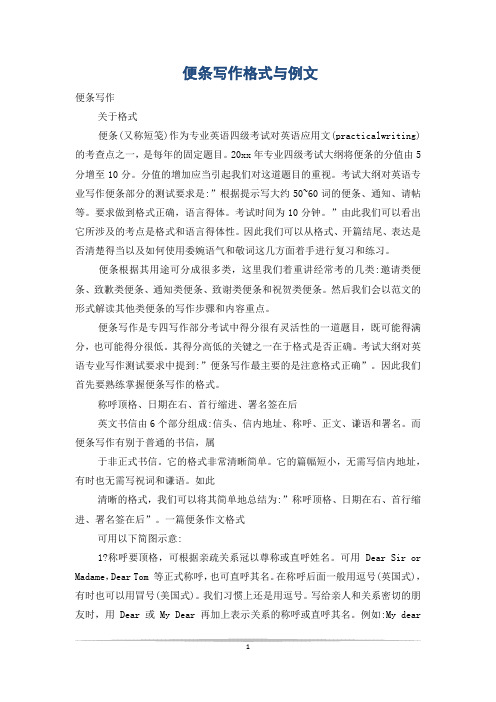
便条写作格式与例文便条写作关于格式便条(又称短笺)作为专业英语四级考试对英语应用文(practicalwriting)的考查点之一,是每年的固定题目。
20xx年专业四级考试大纲将便条的分值由5分增至10分。
分值的增加应当引起我们对这道题目的重视。
考试大纲对英语专业写作便条部分的测试要求是:”根据提示写大约50~60词的便条、通知、请帖等。
要求做到格式正确,语言得体。
考试时间为10分钟。
”由此我们可以看出它所涉及的考点是格式和语言得体性。
因此我们可以从格式、开篇结尾、表达是否清楚得当以及如何使用委婉语气和敬词这几方面着手进行复习和练习。
便条根据其用途可分成很多类,这里我们着重讲经常考的几类:邀请类便条、致歉类便条、通知类便条、致谢类便条和祝贺类便条。
然后我们会以范文的形式解读其他类便条的写作步骤和内容重点。
便条写作是专四写作部分考试中得分很有灵活性的一道题目,既可能得满分,也可能得分很低。
其得分高低的关键之一在于格式是否正确。
考试大纲对英语专业写作测试要求中提到:”便条写作最主要的是注意格式正确”。
因此我们首先要熟练掌握便条写作的格式。
称呼顶格、日期在右、首行缩进、署名签在后英文书信由6个部分组成:信头、信内地址、称呼、正文、谦语和署名。
而便条写作有别于普通的书信,属于非正式书信。
它的格式非常清晰简单。
它的篇幅短小,无需写信内地址,有时也无需写祝词和谦语。
如此清晰的格式,我们可以将其简单地总结为:”称呼顶格、日期在右、首行缩进、署名签在后”。
一篇便条作文格式可用以下简图示意:1?称呼要顶格,可根据亲疏关系冠以尊称或直呼姓名。
可用Dear Sir or Madame,Dear Tom 等正式称呼,也可直呼其名。
在称呼后面一般用逗号(英国式),有时也可以用冒号(美国式)。
我们习惯上还是用逗号。
写给亲人和关系密切的朋友时,用Dear或My Dear再加上表示关系的称呼或直呼其名。
例如:My dearmother,Dear Alice等。
